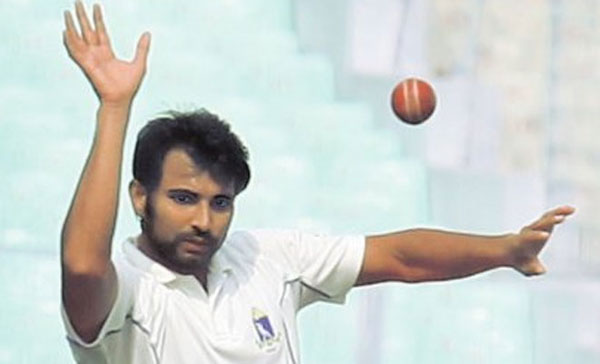Delhi: The Dalhousie Athletic Club is about a kilometre from Eden Gardens in Kolkata. It has a tent that serves as a restaurant and bar for its members, it has a practice pitch – half turf, half cement – and an open field of wild grass for a cricket ground. The ground is unkempt, the grass is long, and the pitch can’t be seen. Dalhousie is not a club known for its cricket.
About six years ago, Sumon Chakraborty of Dalhousie Club called Debabrata Das of Town Club – one of the better cricket clubs in the city – to come to Rajasthan Club and have a look at a young fast bowler.
Das, a former assistant secretary of the Cricket Association of Bengal, asked Chakraborty what the hurry was. He was told it is “a small pearl, kho jayega [he will get lost]”. Das says he reached the ground within 20 minutes, saw 10-15 players practising there, and could easily spot the pearl.
Das recollects: “I asked him, ‘What’s your name?’ ‘Mohammed Shami,’ he said. ‘Where are you from?’ ‘Sahaspur in Uttar Pradesh.’ ‘Do you want to play?’ ‘Yes.’ ‘Your contract is 75,000 rupees per annum, and 100 per day for your lunch.’
“There was one problem. ‘Where will I stay?’ he asked. I said, my house. I took Shami home, and told my wife this guy will stay with us. After that, he started playing for Town Club.”
Playing for Dalhousie before moving to Town Club, Shami had shown pace, but Das says that Dalhousie’s Chakraborty and Sumonto Hajra felt the bowler needed to move on to a bigger club. Until then, Das says, Shami would stay with other Dalhousie players in the tent or shared hotel rooms, and would be out on the train back to Moradabad, at 20 kilometres the closest town to Sahaspur, where Shami’s father ran a spare-parts store for tractors. Shami would make Rs 500 per match at Dalhousie, according to Das.
After taking four wickets in the first innings, and before his five-for in the second, of his Test debut, Shami made it a point to thank his parents at the press conference. They had let him follow his dream without putting pressure on him to start earning. It helped that his father had played a lot of cricket – he bowled fast, too – in his village, and appreciated the dedication it would take to make a career out of the sport. The problem was, Sahaspur didn’t have any cricket facilities. No grounds, no pitches, only mud fields. Forget cricket facilities, Sahaspur still gets electricity only for eight hours a day.
“I saw the pace, though,” says Tousif Ali, Shami’s father. “I could tell he had the skill. His elder brother also bowled fast, but he had a stone in his kidney after which he joined me in the business. The younger brother also bowls fast, but I knew Shami had the pace. I wanted him to give it a good go.”
As Shami graduated through the cricketing ranks, he started playing in Sonakpur in Moradabad. Badruddin Siddique coached him for a year or so and Tousif went a step ahead, again.
“UP doesn’t even have a club system,” Tousif says. “You have to keep going for trials here, where you sometimes get rejected after bowling two-three balls. So I didn’t want the story to end with multiple trials. Badruddin knew some people in Kolkata, so we sent him there.”
This is where Tousif’s knowledge of the progress of his son’s career ends. It was a risk sending a 16-year-old to a new city, where he didn’t know anybody and had the ability to bowl fast as his only sellable skill. Tousif says if Shami faced hardships, he didn’t tell him. It’s a story resonant with large parts of the migrant labour population in India. A year later, though, Town Club happened, and Das took him under his wing.
“Whenever I came to office, I dropped him off to play cricket,” Das says. “After cricket, I used to take him home while returning from work. After one year, I observed he was growing. He was not into gymming or weight training. Running, running, running and net practice. He would take a new ball at the beginning of the net [session], and finish with the last ball, from 1pm to 4pm.”
The workers at Dalhousie say similar things about this scrawny little boy who wanted to bowl fast. They used to doubt him, and Shami was keen to prove them wrong. He liked the workers there and he still comes back to the club whenever he is in town.
“[He is a] Very simple person,” Das says. “Very fond of sleeping, very fond of eating biriyani. In every match against a big team – Town v East Bengal, Town v Mohun Bagan – whenever he was playing, if we needed two urgent wickets, I used to tell him, ‘Shami, phaad de yaar [Burst through them].’ ‘Biriyani?’ he would ask. ‘Yes I will give biriyani.’ ‘Achha gaind do [Okay give me the ball]’.” And he would get the wickets.
There would be a lot of friendly sledging too. Once, in a match against Eastern Railway, Town Club were struggling to get the last two wickets. Das recalls: “I told him, ‘Ghar mein jaake ammi ka kapda leke so ja [Go home, wear your mother’s clothes and go to sleep]. He said, ‘Gaind de [Give me the ball].’ And boom, boom! Two batsmen were bowled.
“Shami never wanted money. His goal was the stumps, the sound that comes from hitting the stumps. Ever since I saw him, most of his wickets were bowled. He bowls with an upright seam, on or just outside off stump, and gets it to cut back in.”
Das says Shami still takes his advice in all matters. “Four months ago, he came to my house and said he wanted to purchase a flat,” says Das. “I did the needful for the registrations etc. without any cost, except for the stamp duty. I think he has taken possession of the flat now.”
Why, then, did Shami leave Das’ Town Club and go to Mohun Bagan? According to Das, it wasn’t the money. “I let him go,” Das says. “If I hadn’t let him go, India wouldn’t have got Shami today. When he was in our club, he made it to the Bengal squad, but didn’t get to play in the XI. I saw the kind of facilities, the political and financial power, and the muscle Mohun Bagan has. We can’t match it. And I wanted the boy to get a chance.
“Yesterday [on Friday], he told me he doesn’t want to play for Mohun Bagan anymore. He is a very emotional cricketer.”
On Friday, Shami ran through the West Indies line-up with 30,000 Kolkatans cheering him on, intimidating the opposition batsmen. Watching in Sahaspur, the family saw their faith had paid off. People now identify Tousif as Shami’s father, and he is proud of it. Seven years ago, he had taken the risk of sending his son alone into the unknown. A year later, another man took the risk of bringing home a boy he knew nothing about, except that he bowled fast.
Cricket can do with more of such fathers, club owners and, of course, boys who bowl fast.


